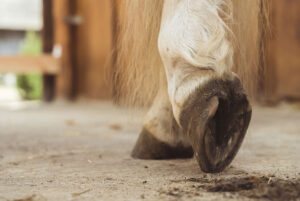Dewormer’s Effect on Scratches

A: First of all, scratches is a skin condition of the lower limbs sometimes caused by a pathogen, be it a virus, bacterium, fungus, or parasite. To answer your question it would help to know more about your horses. What type of environment do they live in, and how do these scratches cases present—is there a seasonal occurrence, or do they appear year-round? Where on your horses are they located? What type of horse do you have? This information would help with identifying the most likely explanation. However, here are a few possibilities for why you saw scratches relief after deworming.
Ivermectin has activity against nematodes, insects, and mites. If the scratches tend to disappear after ivermectin treatment, the explanation could be skin parasites. The most prevalent skin mite infesting horses is Chorioptes equi, which is very common in draft horse breeds with well-developed feathers (long fetlock hair). The mites live in the skin’s superficial layers and cause a chronic itchy dermatitis that often leads to lesions because the horses are scratching themselves. These mites primarily infest the legs, but can also be found elsewhere on the horse’s body. They are sensitive to ivermectin, but oral preparations rarely work because they do not distribute very well to the skin’s superficial layers.
In the insect category we have lice. There are two types of lice that infest horses. The most common is a chewing louse (Bovicola equi), which lives on the skin and eats skin debris. The less common type is a blood-sucking louse, Hematopinus asini. Both of these cause itching, which can lead to scratches. However, ivermectin is not very likely to be effective against the chewing louse, given its superficial location on the skin
Create a free account with TheHorse.com to view this content.
TheHorse.com is home to thousands of free articles about horse health care. In order to access some of our exclusive free content, you must be signed into TheHorse.com.
Start your free account today!
Already have an account?
and continue reading.

Related Articles
Stay on top of the most recent Horse Health news with


















